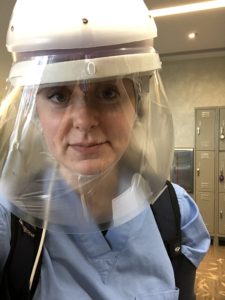From her friends to her fiancé, nearly everything in Dana Branham’s life can be traced back to journalism.
Currently a health reporter for The Oklahoman, Branham’s career has seen her cover some of the nation’s most important stories ranging from Amy Guyger’s murder trial to the opiod epidemic and COVID-19.
All of that experience dates back to her days as an A&M Consolidated Tiger. Branham graduated in 2014 and is a former editor-in-chief of The Roar, something that she remembers fondly.
“I instantly fell in love with it,” Branham said. “It was such a great opportunity to meet so many people that I otherwise would not have. It was just always so rewarding.”
That reward is why she’s passionate about journalism in the first place.
“Every story is a chance to learn something new,” Branham said. “It’s a privilege to get to talk to smart people who know more than me about all sorts of things and get to learn from them and ask questions. I throw myself into a new topic and try to understand it and make it understandable for readers as well.”
While at The Roar, Branham did everything from sports photography to news writing. As Editor-In-Chief, she made a lasting impact on the paper that still is relevant today: Without Branham’s work, it would be impossible to read this very article.
“When I started, there was no website for The Roar,” Branham said. “Going into my senior year, I went to [staff advisor Michael] Williams and said ‘Hey, I want to do this.’ Juggling [the website] on top of the print paper was not easy, [but] it was very rewarding to build something that we hadn’t had before.”
A Pulitzer Prize is the pinnacle of recognition and a career-defining moment for journalists. It can take years, if not decades of effort to achieve the industry’s holy grail. Branham won one straight out of college. Technically.
She was an intern at the Cincinnati Enquirer when they began their “Seven Days of Heroin” series documenting a week in Cincinnati’s raging opioid epidemic. The series would go on to win the 2018 Pulitzer Prize for Local Reporting.
“Everyone had small pieces to play in [the project],” Branham said. “I was just there to observe. I wrote down a time-stamped thing of what I was hearing [and] seeing at a church service for people who were recovering or struggling with addiction. A team of writers and editors took all of our notes—dozens of us—and all that we had gathered and created that beautiful project out of it. It was really cool.”
A look at the stories Branham has written for both the Dallas Morning News and The Oklahoman reads like–well, breaking news. Homicide. Death. Family Violence. Sexual Assault. Mental Health. COVID-19. Working with those topics on a daily basis takes a toll.
“It takes something out of you to cover traumatic things like that over and over,” Branham said. “Everybody copes with it differently. It’s good to be able to talk about [the emotional toll] with people who get it and not keep it to yourself. Therapy is important for journalists. Time off is important for journalists. We have to take care of ourselves to be able to continue the work that we’re doing.”

It would be impossible for Branham, or any other journalist, to do their job without the help of the people who make up these stories, something she appreciates.
“People [are] very welcoming to me,” Branham said. “[They’re like,] ‘Come into my home. Let me tell you about this thing that happened to me. Let me tell you about my loved one.’ That always felt like a privilege to me [with] the hard stories that often involve loss or tragic things like that.”
It’s no secret that the journalism industry is in upheaval. Hedge funds are buying up and gutting newsrooms while newspapers across the country are forced to adapt to the changing landscape or close their doors.
Despite the current struggles of the industry, Branham believes that journalism will continue to survive and even thrive in the future.
“There’s always going to be room for people who really care and really want it,” Branham said. “Journalism in some form or fashion is [still] going to be around. We’ll still be doing that news gathering, reporting, [and] telling stories. It’s just a matter of what it’s going to look like.”
Journalism has provided Branham with not just her career, but her friends and her family. It’s a process that began at Consol, intensified while she served as editor-in-chief at The OU Daily, and continues as part of her professional career.
“A lot of my friends are people that I’ve met at work,” Branham said. “I made such great friends working on the newspaper staff [at Consol], people that I’m still friends with now. And my closest friends now are people that worked at The Daily. [They all] have been in those same kinds of positions.”
The connections that Branham has gained from her passion is something she hopes all students can find for themselves.
“Find something that you really enjoy,” Branham said. “The people that you’ll meet doing that are people that are going to stay in your life. They’re going to be your friends for a long time.”
Note: Tigers in the Wild is a series of alumni profiles that will be featured on The Roar’s website. If you have an idea of someone you’d like to see interviewed, email Ian at ian.curtis.the.roar@gmail.com.

